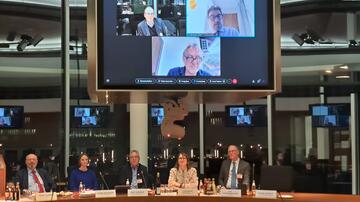Learning lessons from the coronavirus pandemic on containing other infections
Scientists are calling for a new approach for tackling healthcare-associated infections caused by multidrug-resistant bacteria.
Healthcare-associated infections have been growing continuously for years, resulting in hundreds of thousands of avoidable deaths each year. The main culprit is bacteria that have become resistant to several types of antibiotics. Despite these alarming figures, antibiotic resistance has not been considered a priority in politics. Experts from the German Center for Infection Research (DZIF) and other international research institutions warn in the latest edition of Lancet Infectious Diseases that this has to change and are calling for a paradigm shift. Although COVID-19 is caused by viruses, we can import actions from our experience with the pandemic into managing and treating bacterial healthcare-associated infections.
“We have become too used to the fact that many of our risk patients become seriously ill and die as a result of neglected hygiene, poor compliance with infection control procedures, inappropriate antimicrobial use and a lack of interest in the pharmaceutical industry to research antibiotics.” Scientists Prof. Maria Vehreschild (Cologne), Prof. Andreas Peschel (Tübingen), Prof. Evelina Tacconelli (Verona/Tübingen) and Prof. Christian Giske (Stockholm) have issued this warning in the hope of initiating a broad discussion. Maria Vehreschild, Evelina Tacconelli and Andreas Peschel are also conducting research together on the DZIF field of “Healthcare-associated and Antibiotic-resistant bacterial Infections”.
In their article in the journal, the scientists state that “the necessary efforts against nosocomial infections will be substantial but marginal compared with the current acitivities against COVID-19.“ With relatively little effort, we could make great strides in containing healthcare-associated infections. The issue of what efforts and what resources are needed in the future to treat life-threatening but avoidable infectious diseases beyond COVID-19 is becoming more and more urgent.
The team of infectious medicine doctors and scientists from the DZIF, the Tübingen Excellence Cluster Controlling Microbes to Fight Infections (CMFI) and renowned research institutions from other countries have started a global public appeal for a paradigm shift in managing healthcare-associated infections. Although the risk groups for COVID-19 and for healthcare-associated infections largely overlap, the topic of antibiotic resistance has been woefully neglected for years and there has been a lack of the necessary awareness in society, according to the team.
“The coronavirus pandemic has put infectious diseases on the political agenda. After corona, we should not simply go back to business as usual; we need to take a new direction, particularly with other serious but avoidable infectious diseases,” stresses DZIF scientist Maria Vehreschild, co-author of the appeal. The authors firmly believe that with relatively little effort, we could make great strides in containing healthcare-associated infections.




